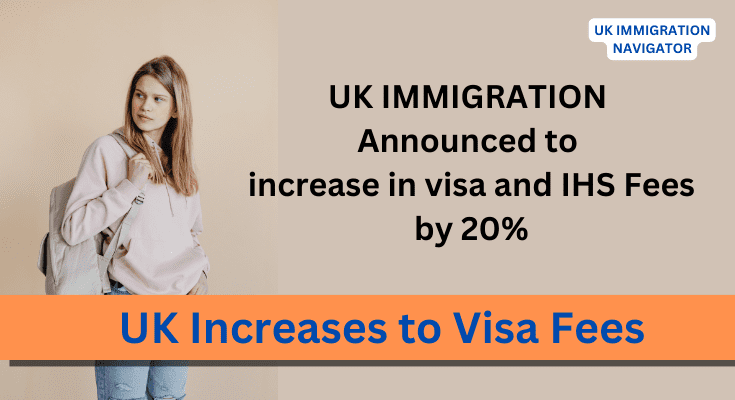UK Increases to Visa Fees?
In a move that will impact both employers and visa applicants, the UK Increases to Visa Fees across the board. These changes are set to have far-reaching implications for individuals and families seeking visas for various purposes. The decision to implement these fee hikes is driven by the government’s intention to generate funds for public sector pay awards. This strategic step comes amid ongoing negotiations with trade unions over salary and employment terms, with the government aiming to secure over £1 billion through these fee increases.
Table of Contents
What’s Changing in the Visa Fees Landscape?
While the exact details of the fee adjustments are expected to be clarified in upcoming regulations, the key modifications include:
- Immigration Health Surcharge (IHS) Increase: The IHS, a mandatory charge ensuring access to NHS healthcare, will see a substantial rise from £624 to £1,035 per year for adults. For students and those under 18, the charge will increase to £776 per year.
- Visit and Work Visa Application Fees: Fees for visit and work visa applications will experience a 15% increase, impacting those seeking entry for tourism, business, or employment purposes.
- Student Visas, Settlement, and Citizenship Fees: Student visa fees, along with charges for settlement, citizenship, certificates of sponsorship, and all other visa applications, will undergo an increment of at least 20%.
- Uniform Priority Service Costs: The cost of priority services will be standardized, whether applicants apply from within or outside the UK.
Notable Exclusion: Immigration Skills Charge (ISC)
Notably absent from the announcement is the Immigration Skills Charge (ISC), a fee payable by sponsors when assigning a certificate of sponsorship. Unlike visa applicants, this charge is covered by sponsors or employers.
The Impact of IHS Increases
Although IHS fees have remained stagnant for the past three years, the forthcoming surge in charges will significantly impact the overall cost of visa applications, particularly for families. The IHS payment, a prerequisite for free healthcare access in the UK, remains compulsory regardless of actual NHS usage or personal medical insurance.
Exemptions to the IHS
Certain categories of visa applicants are exempt from the IHS requirement. These include:
- Those applying for a visa lasting six months or less.
- Visitors and applicants seeking settlement or British citizenship.
- Applicants to the EU Settlement Scheme for pre-settled or settled status.
A Glimpse of the Upcoming Fee Adjustments
Here’s a sneak peek at some of the upcoming fee adjustments:
| Application | Current fee (GBP) | New fee (GBP) |
|---|---|---|
| Immigration Health Surcharge – adults (per year) | £624 | £1,035 |
| Immigration Health Surcharge – children under 18 | £470 | £776 |
| Skilled Worker or GBM – up to 3 years (outside UK) | £625 per applicant (£479 for shortage occupation roles) | £719 per applicant (£551 for shortage occupation roles) * |
| Skilled Worker or GBM – 3 to 5 years (outside UK) | £1,235 per applicant (£943 for shortage occupation roles) | £1,421 per applicant (£1,085 for shortage occupation roles) * |
| Skilled Worker or GBM – up to 3 years (inside UK) | £719 per applicant (£479 for shortage occupation roles) | £827 per applicant (£551 for shortage occupation roles) * |
| Skilled Worker or GBM – 3 to 5 years (inside UK) | £1,423 (£943 for shortage occupation roles) | £1,637 (£1,085 for shortage occupation roles) * |
| Certificate of Sponsorship (CoS) for Skilled Workers | £199 | £239 * |
| Temporary Worker, including GAE, Creative Worker, Youth Mobility | £259 per applicant | £298 per applicant * |
| Settlement (indefinite leave to remain) | £2,404 | £2,885 * |
*Exact numbers are subject to confirmation.
Implementation Timeline
While no specific timeline has been announced, the government is expected to expedite the fee increases. Parliament is likely to review the necessary regulations post-summer recess, with the changes potentially taking effect in late summer or autumn 2023.
Navigating the Transition: Employer Considerations
These impending fee hikes pose considerable challenges for both individuals and businesses, particularly start-ups and SMEs. Employers should consider the following strategies:
- Encourage early applications to capitalize on existing lower fees before the adjustments kick in.
- Budget for increased recruitment costs associated with higher visa fees.
- Establish a clear stance on which visa expenses the business will cover for employees.
- Explore clawback agreements to ensure cost recovery if employees leave shortly after visa approval.
- Prepare for potential employee inquiries about additional support to ease visa-related financial strain.
Conclusion
The UK’s decision to raise visa application fees underscores its efforts to address public sector pay awards. While these fee increases might pose challenges, early planning and strategizing can help individuals and businesses navigate these changes effectively.
FAQs
- Why is the UK increasing visa fees? The government aims to generate funds for public sector pay awards through these fee adjustments.
- When will the fee increases take effect? While exact dates are pending, the changes are likely to come into force in late summer or autumn 2023.
- How will employers be impacted by these fee hikes? Employers may face higher recruitment costs and should consider their stance on covering visa expenses for employees.
- Can applicants be exempt from the IHS? Certain categories of applicants, like those applying for short-term visas or settlement, may be exempt from the IHS.
- What can individuals do to mitigate the impact of fee increases? Applying early to take advantage of current fees and exploring employer support options can help ease the financial strain of increased fees.




This is one of the best postings I’ve read in quite a while. Nice work.
Interesting content. I’m glad I came across this page. I’m going to save it so I can read any more upcoming posts.
At last, something worth reading. It’s always nice to find postings like this one.
It’s quite refreshing to come across great content such as this. Keep up the good work.
Pingback: UK Seasonal Worker Visa In 2025 - UK Immigration Navigator